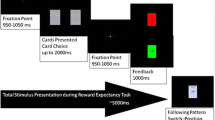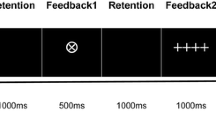Abstract
This study examined the effects on arousal of feedback regarding prediction accuracy without monetary gain or loss versus accuracy feedback combined with monetary contingency involved in most gambling. Physiological and subjective arousal was assessed in frequent (n = 35; 16 females) and infrequent gamblers (n = 35; 16 females) during participation in a laboratory gambling game. Both samples consisted of undergraduate student volunteers. In one condition, subjects gambled money on their predictions about a sequence of events, hence receiving both feedback and monetary outcome. In the other condition, only feedback about accuracy was provided, with no money wagered. Arousal was greater for both groups during actual gambling than in the feedback only condition. Across both conditions, frequent gamblers exhibited greater arousal than did infrequent gamblers. There were, however, no significant Group X Condition interactions. These results suggest that actual monetary contingency rather than accuracy feedback alone is most motivating in gambling. Methodological limitations possibly related to the lack of Group X Condition interactions were discussed.
Similar content being viewed by others
References
Anderson, G., & Brown, R.I. (1984). Real and laboratory gambling, sensation-seeking and arousal.British Journal of Psychology, 75, 401–410.
Dickerson, M., & Adcock, S. (1987). Mood, arousal and cognitions in persistent gambling: Preliminary investigation of a theoretical model.Journal of Gambling Behavior, 3(1), 3–15.
Hodes, R., Cook, E., & Lang, P. (1985). Individual differences in autonomic response: Conditioned association or conditioned fear?Psychophysiology, 22(5), 545–560.
Ladouceur, R., Mayrand, M., & Tourignay, Y. (1987). Risk-taking behavior in gamblers and non-gamblers during prolonged exposure.Journal of Gambling Behavior, 3(2), 115–122.
Leary, K., & Dickerson, M. (1985). Levels of arousal in high- and low-frequency gamblers.Behaviour Research and Therapy, 23(6), 635–640.
Lesieur, H., and Blume, S. (1987). The South Oaks Gambling Screen (SOGS): A new instrument for the identification of pathological gamblers.American Journal of Psychiatry, 144, 1184–1188.
Lesieur, H., Cross, J., Frank, M., Welch, M., White, C., Rubenstein, G., Moseley, K., & Mark, M. (1991). Gambling and pathological gambling among university students.Addictive Behaviors, 16, 517–527.
Phillips, J., & Amrhein, P. (1989). Factors influencing wagers in simulated blackjack.Journal of Gambling Behavior, 5(2), 99–111.
Watson, D. & Tellegen, A. (1985). Toward a consensual structuring of mood.Psychological Bulletin, 98, 219–235.
Author information
Authors and Affiliations
Rights and permissions
About this article
Cite this article
Roby, K.J., Lumley, M.A. Effects of accuracy feedback versus monetary contingency on arousal in high and low frequency gamblers. J Gambling Stud 11, 185–193 (1995). https://doi.org/10.1007/BF02107114
Issue Date:
DOI: https://doi.org/10.1007/BF02107114




